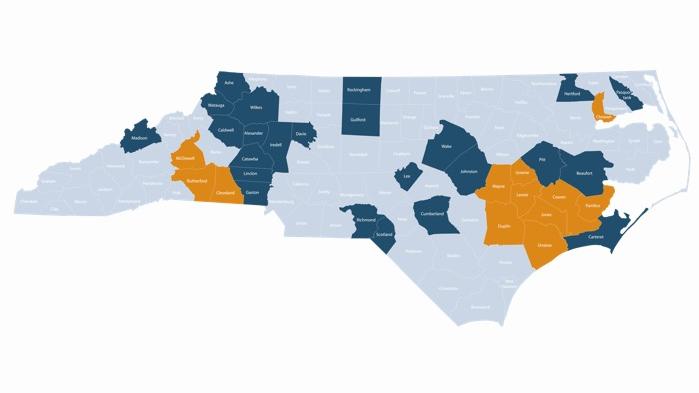In 2011, the NC Eastern Region, now the NCEast Alliance, began a pilot program to certify counties as NC Work Ready. That program now serves as the model for the statewide NCWorks Certified Work Ready Communities initiative.
By James T. Simpson, CAE
For communities across North Carolina, attracting, training and retaining workforce is a top concern. North Carolina’s job creators continue to face a significant disconnect between their talent needs and the real-life skillsets possessed by graduates. Both specific skill shortages and soft skill barriers are constant themes of the discussion. Even as unemployment numbers improve, employers across the state continue to struggle filling open positions with qualified talent.
The Department of Commerce’s Labor and Economic Analysis Division recently released its 2016 Employer Needs Survey. After collecting 1,900 surveys, more than a third of businesses surveyed expressed difficulty in filling positions. Finding candidates with the right work experience, education and technical skills were the top reasons cited. Businesses in construction and manufacturing expressed the most difficulty. The survey also found that these difficulties were true in both urban and rural parts of the state.
Communities across the state are working to shift this discussion with those in Eastern North Carolina leading the way. NCWorks Certified Work Ready Communities (CWRC) launched in response to this growing skills gap. In 2011, the NC Eastern Region, now the NCEast Alliance, began a pilot program to certify counties as NC Work Ready. That program now serves as the model for the statewide NCWorks Certified Work Ready Communities initiative.
Scaling the NCEast Alliance program is a collaborative effort, including the North Carolina Chamber Foundation, the Office of the Governor, the North Carolina Department of Commerce, the North Carolina Department of Public Instruction and the North Carolina Community College System. The NC Chamber Foundation serves as the final certifying body to designate a county NCWorks Certified Work Ready.
With local collaboration and an engaged business community NCWorks CWRC is expanding quickly, with employers, job-seekers and economic developers alike seeing great returns. Counties applying for certification form a similar collaborative partnership with local chambers of commerce, local workforce development boards, public schools, community colleges and business leaders. Together they create the framework for achieving certification goals, including increasing high school graduation rates, the number of National Career Readiness Certificates (NCRC) and employer engagement.
Based on ACT’s WorkKeys system, the NCRC assesses job seekers’ foundational skills to ensure they are ready to work in today’s technology-driven environment. Making sure workers have the correct job-specific foundational skills gives employers confidence that job applicants are prepared for on-the-job training and higher level skill development. Companies that make the effort to develop WorkKeys Job Profiles are the best positioned to find the right job applicant that possesses a NCRC. NCWorks Certified Work Ready Communities is closing the skills gap via stackable, industry-recognized credentials.
“As an employer, our company understands the value of a well-trained workforce. We have had several of our jobs profiled, and the resulting use of CRC scores has helped us put the right people in the right jobs. It has also helped us see where our employees’ weak spots were, and that knowledge helped us design our in-house training to correct those deficiencies,” said Chris Martin, human resources director at Mt. Olive Pickle.
When McDowell County was certified earlier this year, Nikki Pittman, human resources manager at Columbia Forest Products, noted that her employer is happy to be a part of the Work Ready Community in McDowell.
“This program has helped our industry out by matching individuals to jobs based on the skill levels of our company,” said Pittman. “The Work Ready Community helps each of the industries in the community to communicate what needs ‘we’ as employers need from the schools to help us get the best qualified candidates for our job openings. We currently have 41 employers in McDowell that recognize the value of a job seeker that applies with their company that have the CRC certification. With this training in place, many companies realize that we have a shorter training time of new hires also. This program gives the workers a clear understanding of what each of the companies’ goals and skill sets are to help them to become successful in their upcoming careers.”
Today 37 of North Carolina’s 100 counties are participating in the Work Ready Communities program and 13 of those have been named NCWorks Certified Work Ready Communities. Through this effort, more than 300,000 job-seekers have been certified as career ready and nearly 1,700 North Carolina employers have signed on to participate.
While our state is certainly moving the needle on providing a workforce with documented foundational skills, there is much more work to be done to make North Carolina more competitive. In July, South Carolina Governor Nikki Haley announced that all 46 South Carolina counties have received the Work Ready Community certification, making her state the first in the nation to become fully certified as work ready.
Job creators have a powerful role to play in moving this initiative forward. To find out how your business and local community can get involved, visit ncchamber.net/foundation.
James T. Simpson, CAE is chief operating officer of the North Carolina Chamber and president of the North Carolina Chamber Foundation.

